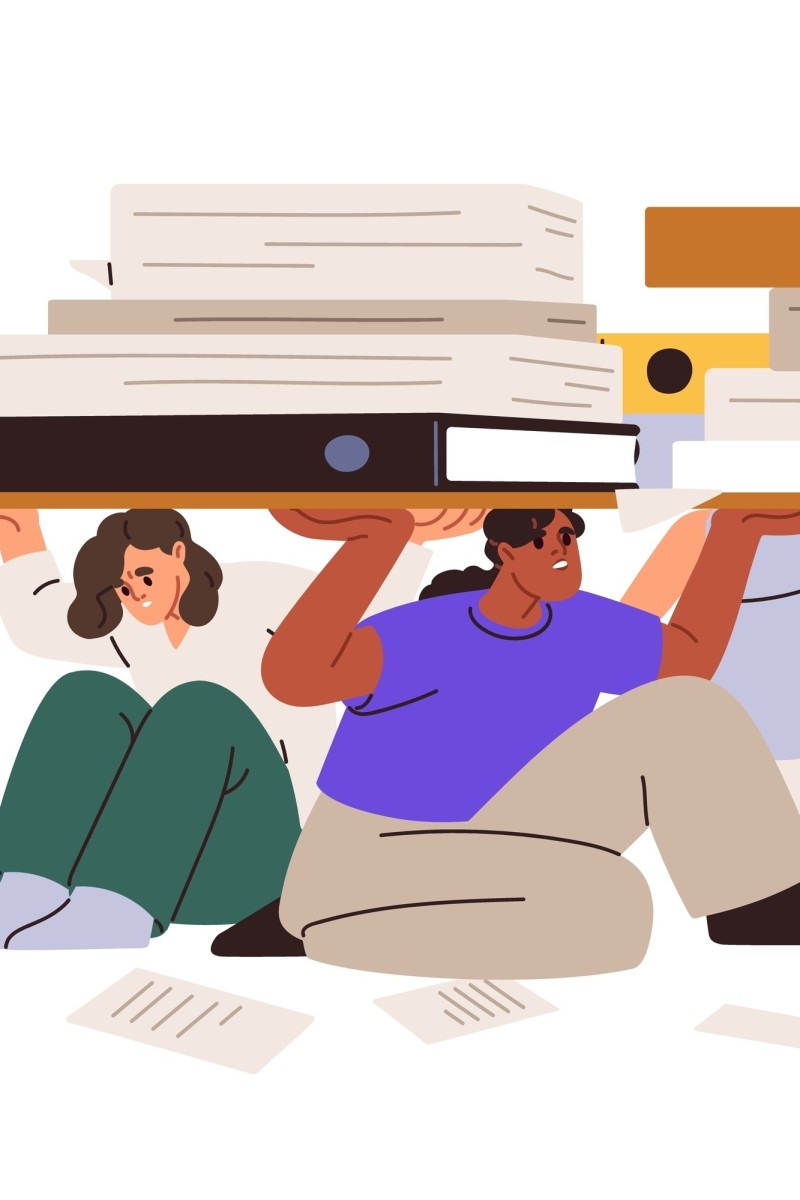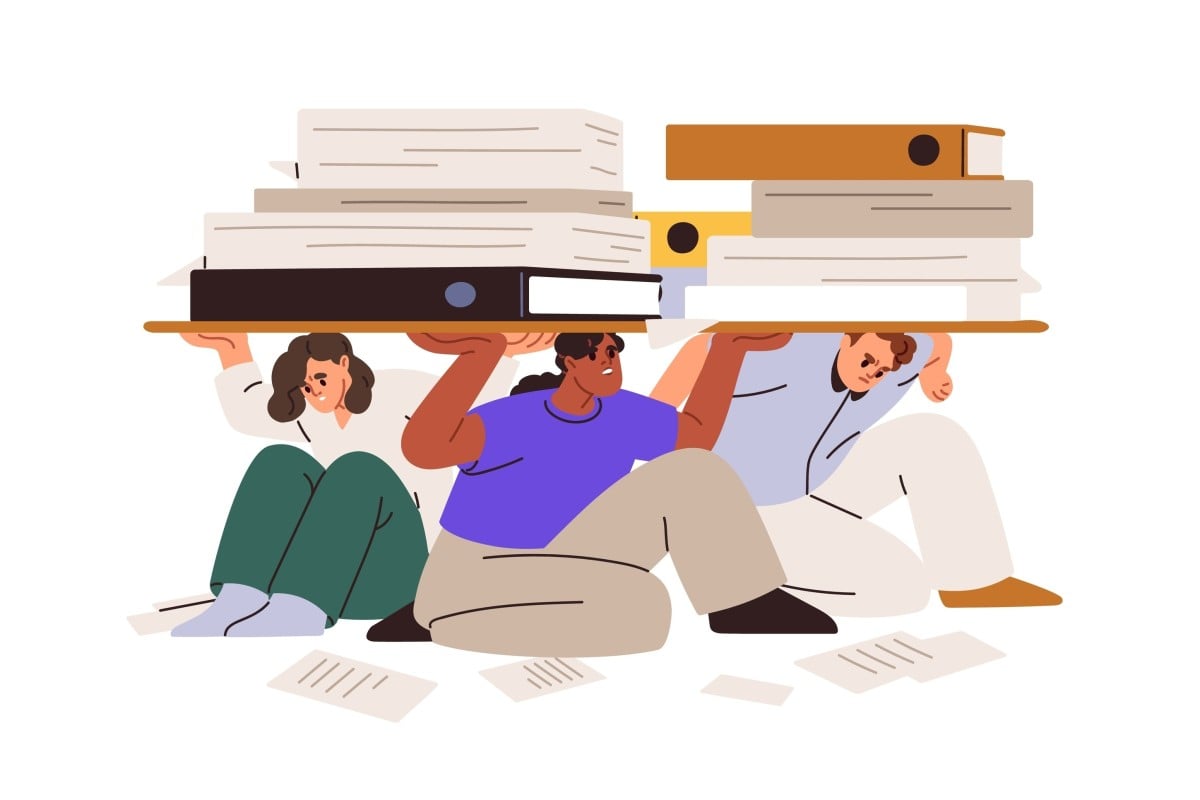
Your Voice: Demanding workloads, eliminating devices from classrooms (long letters)
Students write about burnout across school systems and whether electronics like iPads and smartphones should be forbidden on campus.
 Hong Kong’s different school systems are similarly demanding, one student writes. Photo: Shutterstock
Hong Kong’s different school systems are similarly demanding, one student writes. Photo: ShutterstockHave something to say? Send us a letter using this Google form.
Different schools, same fatigue
Krista Chan, Canadian International School of Hong Kong
There is a girl in my extracurricular class from a local school. Often, she sits slumped in her chair, eyes closed, lids heavy with fatigue. My sister and I will drag ourselves into the room, slouching like sloths. After eight hours of school, standing in the MTR and walking here, we are all exhausted.
However, there is an assumption that I cannot be burnt out because I attend an international school. Let me explain.
I remember one day lugging around my violin, swimming bag, laptop and school bag across the city to this lesson. We all entered the classroom, and the teacher noticed our worn-out faces. The girl from the local school shared her day, mentioning two quizzes and a swimming class. We sympathised with her.
Then the teacher turned to me and asked, “Why are you tired? Don’t international students have no homework and tests? You should be happy!”
I love my school and being part of its community, but in that moment, I felt frustrated. After finishing three summative assessments, a presentation and my own swimming lesson, I held myself back, smiling but clenching my fists under the table.
There is a wide variety of Hong Kong school systems. This includes the “local” new senior secondary academic structure, which replaced O and A Levels with the Diploma of Secondary Education university entrance exam in 2012. Other schools in Hong Kong – including comprehensive, subsidised, grant, private and private international – may follow various non-local curriculums.
I attend a private international school that uses the International Baccalaureate format, with fewer exam periods than local schools and more assessments spread throughout the year that usually overlap. Our classwork includes assignments such as experiments and writing pages and pages of detailed lab reports.
How to improve the waste reduction scheme, saving endangered sea turtles (long letters)
All schools are challenging in Hong Kong, just in different ways. Choosing one depends on many factors, like location, income, family background and extracurricular interests. However, I believe we all experience stress and exhaustion, whether you’re in a so-called local or international school.
I think there is a misconception that international school students do not study or have any work to do. I expect a heavy and demanding workload as I approach the end of secondary school.
It is time we learn about the different school systems and try to understand each other’s challenges and stress without downplaying or disparaging one another.
Back to basics schooling
Irene Zhang, Pope Paul VI College
I am writing to share my thoughts on Sweden’s recent education reform regarding electronic devices in schools. There has been much debate on reducing or moving students off digital devices. I believe it can coexist with traditional education, even complementing one another.
Swedish teachers are placing a new emphasis on “back-to-basics” schooling, according to the Associated Press. This means traditional learning methods like printed books, quiet reading time and handwriting practice instead of dedicating time to tablets, independent online research and keyboarding skills.
One of the most significant benefits would be gaining students’ focus in class. Various studies have shown that electronic devices cause students to split their attention in class, whether because of text messages, social media notifications or even game apps.
According to a 2018 study published in the scientific journal Educational Psychology, this split attention negatively affects long-term retention and exam performance.
Digitalisation has cost students adequate communication, reading and handwriting skills. Returning to traditional education, where they can interact in person with schoolmates and write on paper with a pen, will allow them to train these essential skills.
On the other hand, eliminating electronic devices entirely could bring about its own challenges. Students may struggle to adapt to a sudden shift away from tech, especially after becoming accustomed to digital learning. Imagine the confusion if schools abruptly reverted to traditional methods after integrating technology for years.
Pet-friendly buses, resisting peer pressure (short letters)
Furthermore, devices provide access to learning resources beyond textbooks. Without them, students might miss their opportunity to dig deeper.
I do not believe digital education should just fade away. Technology can enhance a student’s learning experience. For instance, there are incredibly useful applications for organising study notes. It can complement traditional methods and, with proper management, positively affect academic performance.
The issue is not the use of digital devices but rather the need for self-discipline. Schools should focus on addressing this misuse rather than reducing device usage altogether. As the saying goes, “One must have good tools to do good work.”
We should focus on managing devices wisely and finding a balance between technology and traditional learning methods.
